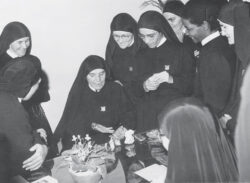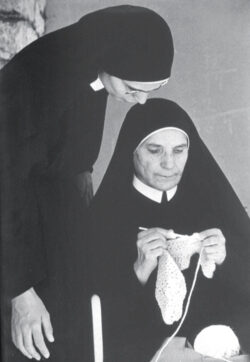Saying yes to the request to write a short article about Maestra Tecla, despite the fact that I had not known her personally and had never read anything specifically about her, proved to be quite an adventure for me. Certainly as a Pauline priest, and thus a member of the Pauline Family, I had often heard her name mentioned and knew more or less about what she had done. But this particular occasion required me to do a little more research on her and in the process I discovered a truly great woman, a holy woman, a woman in love with God, who bet her whole life on him and collaborated with him. Her obedience to the Lord sprang from love, which made her an extraordinary instrument in his hands for constructing, together with the Founder, Fr. James Alberione, the stupendous branch of the Pauline Family known as the Daughters of St. Paul.
 Maestra Thecla had her priorities right: God first and everything else afterward. She exclaimed: “The Lord loves us so much–we have no idea how much…. Once in a while, let’s stop to consider how many graces we have received!” This realization prompted her to urge her sisters: “Do everything for the love of God; always do everything for the Lord!” Her personal program of life for the Holy Year of 1950 reads: “I want all the minutes, hours, days and months of this year to be for God–only for him…. May my life be a continuous Magnificat and adoration of him for the abundance of graces I have received.”
Maestra Thecla had her priorities right: God first and everything else afterward. She exclaimed: “The Lord loves us so much–we have no idea how much…. Once in a while, let’s stop to consider how many graces we have received!” This realization prompted her to urge her sisters: “Do everything for the love of God; always do everything for the Lord!” Her personal program of life for the Holy Year of 1950 reads: “I want all the minutes, hours, days and months of this year to be for God–only for him…. May my life be a continuous Magnificat and adoration of him for the abundance of graces I have received.”
Although her whole life was lived under the banner of the apostolate, with great responsibilities and unceasing activity, Maestra Thecla continually reminded herself and her daughters to “see to it that our hearts belong wholly to God, that we make progress in loving the Lord day after day…. Let’s put our spiritual work above everything else…. Our prayer life must take first place.”
If God is to be the center of one’s life, then one must aim at holiness, at intense communion with him, so as to be his instruments and collaborators in proclaiming the Gospel by every means available. And the first and foremost of these means is one’s own life and witness: “Let us always remember that we are here to become holy, to reach perfection,” Prima Maestra said. “If we are not striving to become holy, then what are we doing here?” On another occasion, she advised the sisters: “Seek first of all to glorify God by becoming holy and doing good to souls. Everything passes! Never forget: we are here for the Lord!”
Reading some of Maestra Thecla’s conferences, I noticed her wisdom–the fruit of her long experience–in grasping the problems her daughters found in living community life (“our maximum penance!” as she called it). She offered them pearls of wisdom for overcoming obstacles in relationships so as to race along the path of love for the Lord and for one’s sisters and brothers. “Our ego is bossy,” she said bluntly. “It wants, it demands, it commands, and when we do not please it, the result is sulking, bad moods, sadness…. This demanding ego is a tyrant that takes advantage of our bad inclinations, our pride.” She sadly concluded that “there are some sisters who never make any progress. They are always at the same point. Why? Because they think too much about themselves! Sometimes we can be very selfish. We fashion our own little world and woe to anyone who touches it! Instead, we have to correct our flaws by finding their roots. When we do this, we see that the reason for our behavior is usually self-love or pride or vanity or envy or jealousy or laziness, etc.”
She invited her daughters to look at things in a new, more Gospel-oriented way: “Always think well of others,” she urged. “We will never make a mistake by doing this. Let’s get used to judging others positively. It is better to err by thinking well of our companions than by thinking badly of them.” She illustrated this with a charming example: “We should be like bees that fly from flower to flower, gathering nectar to make honey.… Let’s be like bees–always looking for the good in our sisters, always seeing God in them.”
 Maestra Thecla’s life was wholly dedicated to the Pauline mission, to the proclamation of the Gospel, which is all the more effective when it is founded on a deep relationship with God and on a joyful life of communion with one’s sisters. “Can’t you see what a beautiful apostolate we have?” she asked her daughters. “There are so many souls to be saved, so many souls waiting for God! Do we love souls?” Beautiful, and rightly so, is her often-quoted statement: “I wish I had a thousand lives to devote to the Gospel!” backed up with the resolve: “Let’s dedicate our feet to spreading the Word of God!”
Maestra Thecla’s life was wholly dedicated to the Pauline mission, to the proclamation of the Gospel, which is all the more effective when it is founded on a deep relationship with God and on a joyful life of communion with one’s sisters. “Can’t you see what a beautiful apostolate we have?” she asked her daughters. “There are so many souls to be saved, so many souls waiting for God! Do we love souls?” Beautiful, and rightly so, is her often-quoted statement: “I wish I had a thousand lives to devote to the Gospel!” backed up with the resolve: “Let’s dedicate our feet to spreading the Word of God!”
She invited her sisters to “be big-minded, big-hearted; to think of the whole world, of the countless souls waiting for the light of the Gospel.” To the sisters who brought the Good News to homes, schools, businesses, etc., she said: “Propaganda cannot be reduced to walking around with a bag of books. It means reaching out to souls, seeking their good and working for their salvation.” She always reminded her daughters that what was essential was to faithfully carry out the great project to which God had called them: to live in his presence and collaborate with him by bringing light and joy to people in every place and time.
 Maestra Thecla spent her life at the side of Fr. Alberione, who, in keeping with the plan of God, wanted her presence and support in the extraordinary adventure of founding and forming the Pauline Family. He would later call the day he first met her “a day of blessing” for him. Who knew Prima Maestra better than Primo Maestro? “I owe her so much,” he said, “because she enlightened me and pointed me in the right direction in both happy and sad circumstances. She was a comforting presence in the midst of all the obstacles on our common path. In various forms and ways, she contributed to the growth of the other Institutes of the Pauline Family.” A few days after her death, the Founder emphasized that the two great secrets of Prima Maestra’s life were humility and faith: humility, which led her to docility, and faith, which led her to prayer. He said she was a contemplative soul, who lived in continual union with the Lord wherever she was. He likened her to a beam of light that grew steadily in radiance because she sought only the glory of God. He told her daughters: “I would like all of you to be like Prima Maestra Thecla. She was a program of life for every Daughter of St. Paul.”
Maestra Thecla spent her life at the side of Fr. Alberione, who, in keeping with the plan of God, wanted her presence and support in the extraordinary adventure of founding and forming the Pauline Family. He would later call the day he first met her “a day of blessing” for him. Who knew Prima Maestra better than Primo Maestro? “I owe her so much,” he said, “because she enlightened me and pointed me in the right direction in both happy and sad circumstances. She was a comforting presence in the midst of all the obstacles on our common path. In various forms and ways, she contributed to the growth of the other Institutes of the Pauline Family.” A few days after her death, the Founder emphasized that the two great secrets of Prima Maestra’s life were humility and faith: humility, which led her to docility, and faith, which led her to prayer. He said she was a contemplative soul, who lived in continual union with the Lord wherever she was. He likened her to a beam of light that grew steadily in radiance because she sought only the glory of God. He told her daughters: “I would like all of you to be like Prima Maestra Thecla. She was a program of life for every Daughter of St. Paul.”
I would like to end by quoting a statement of Maestra Thecla that I found particularly striking. She would often say, “Let’s be smart!”–a way of inviting her daughters to pay attention to her next words, which she considered important and necessary to helping them grasp the abundance of graces and gifts that God continually showered upon the Institute for its growth and enhancement. “Let’s be smart!” she said vigorously. “Let’s spend all our life, all our strength, all our thoughts, all our affections for God, only for him…. Let’s be smart: we have to do God’s will one way or another–either out of love or out of obligation… If we were smart enough to do everything as well as we can, if we were smart enough to lovingly welcome and accept what happens to us each day, then we would always be happy…. Let’s be smart! Let’s fill every moment of our religious life with God. Life goes by fast–faster than we think…. So let’s be smart! Let’s eliminate from our lives anything that displeases the Lord. We have so many chances to do this! Let’s not waste them…. Let’s be smart! Let’s seek only and always the glory of God and the good of souls!”
Fr. Vito Spagnolo, ssp
